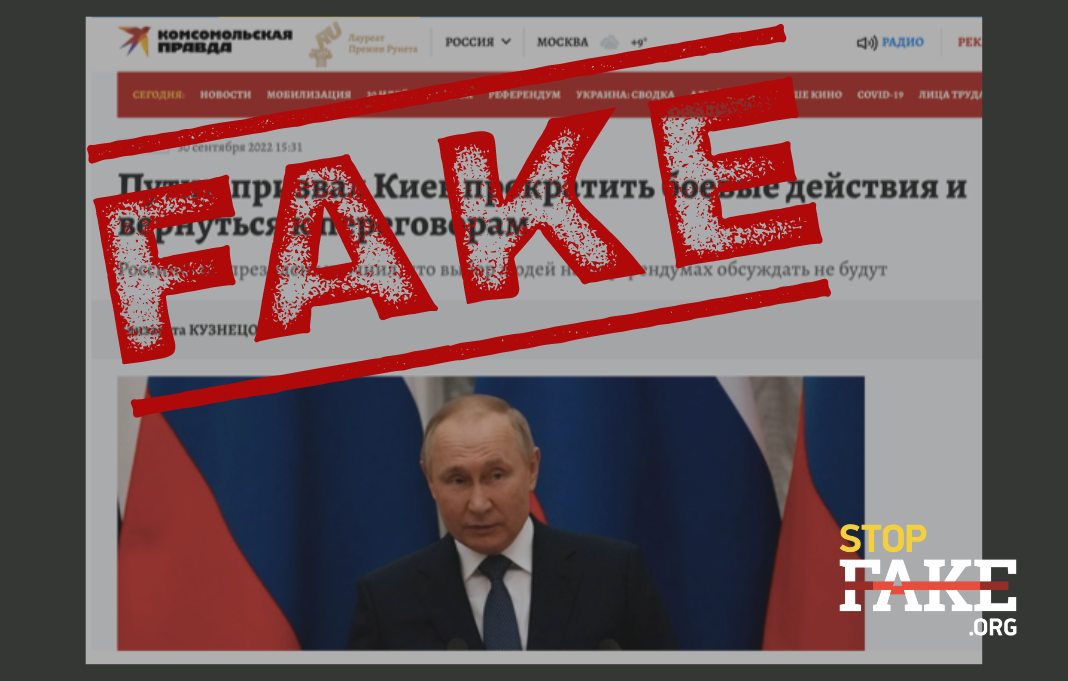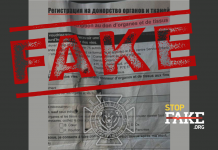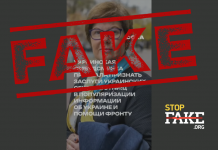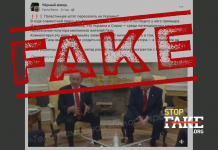Since 2014, when Russia first unleashed a war against Ukraine, Kyiv has repeatedly called on Russia to negotiate for peace. President Volodymyr Zelensky has often declared his willingness to talk directly to Putin. Even after the Kremlin’s pseudo-referendums, Ukraine is still ready to resume negotiations with Russia, just no longer with Putin as its leader.
Russian media have been disseminating a quote from Russian President Putin, who said that “Ukraine started a war back in 2014,” began “fighting a war” against “itself,” and subsequently “refused to sit down at the negotiating table”. Putin assures that Russia is allegedly playing the role of “peacemaker” in trying to “stop” this war.
“We call on the Kyiv regime to an immediate ceasefire, and return to the negotiating table. We are ready for this, it has been said more than once,” the Kremlin media quoted Putin.
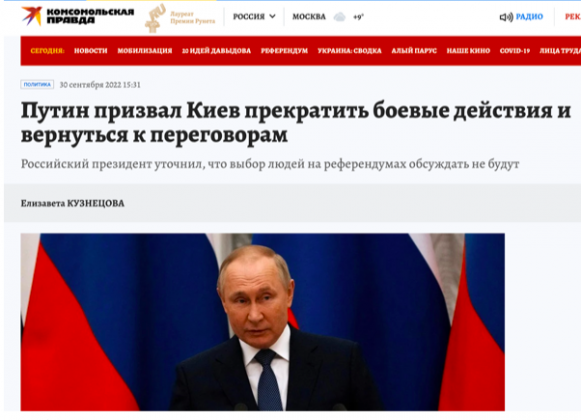
The Russian narrative of a “bloodthirsty” Ukraine, which, according to Putin, periodically attacks itself, has been actively used by the Kremlin since 2014. The Russian attack on Ukraine in 2014 is an established fact. At the March 15, 2014 UN meeting in New York, U.S. Ambassador to the UN Samantha Power accused Russia of violating key principles of the United Nations that prohibit using force on foreign territories and encourage respect for the sovereignty and territorial integrity of all nations. Ukraine also received the support of democratic UN member states when the UN General Assembly Resolution supporting Ukraine’s territorial integrity was adopted on March 27, 2014.
Ukraine’s willingness to negotiate with the Russian aggressor that occupied and annexed Crimea and unleashed the war in the Donetsk and Luhansk regions in 2014, is confirmed at least, by the signing of the first and second Minsk agreements in 2014-2015. Ukraine also regularly participated in meetings of the Trilateral Contact Group on the peaceful settlement of the situation in Donbas, but Russia continued to issue its ultimatums and demanded the occupied territories to be recognized as “Russian,” accusing the Ukrainian authorities of “sabotaging the Minsk agreements”.
Newly elected President Volodymyr Zelenskyy also confirmed his readiness to directly talk to Putin in 2019. In a July 2019 video message, Zelenskyy said he was ready for a direct conversation with Putin together with other world leaders in Minsk.
“I want to address Russian President Vladimir Putin. We need to talk. We must. Let’s do it. Let’s discuss whose Crimea is and who isn’t there in Donbas… I suggest the following company for this conversation: myself, you, US President Donald Trump, British Prime Minister Theresa May, German Chancellor Angela Merkel, French President Emmanuel Macron. Place? I think Alexander Grigoryevich Lukashenko would be happy to host us in Minsk,” Zelensky addressed Putin.
At the end of 2019, for the first time in several years, the Normandy Format summit was held, during which Zelensky and Putin negotiated and agreed to a complete cease-fire along the contact line. Russia ignored the decisions of that summit.
Increasing the level of aggression, Russia issued an ultimatum to the civilized world on December 17, 2021. The Russian Foreign Ministry called its demands “a draft agreement with NATO and the U.S. on mutual security guarantees,” but in fact, Russia demanded that the West comply and surrender all of Eastern Europe into the sphere of Russian influence. Among other things, the Kremlin demanded that Western states hand Ukraine over to Russia, and hysterically insisted that NATO “pack up” and return to the 1997 borders” (i.e. without the Czech Republic, Hungary, Poland, Estonia, Bulgaria, Lithuania, Latvia, Romania, Slovakia, Slovenia, Albania, Croatia and Montenegro – editor’s note).
Despite Russia’s aggressive rhetoric and its admittedly impossible demands, over four days, from January 10 to 13, 2022, there were three rounds of talks between the U.S., NATO, OSCE and Russia, with Moscow continuing to demand unquestioning obedience from the world. The Kremlin’s claim about “NATO and Ukraine refusing to hear” Russia is refuted by the very fact of these consultations. Russian blackmail did not work and the sides did not agree on most issues. Russia then threatened the West with “an inevitable worsening of the security situation in all countries without exception”. Which, in fact, happened on February 24, 2022, when Russia began bombing Ukrainian cities in the early hours of the morning.
After Russia unleashed its full-scale war, President Zelensky still repeatedly urged Putin to sit down at the negotiating table. “I want to address the president of the Russian Federation once again. Fighting continues all over Ukraine. Let’s sit down at the negotiating table. To stop the loss of lives,” Zelensky said on February 25, the second day of Russia’s full-scale invasion.
A series of Ukrainian-Russian talks on ending the war took place in the spring of 2022. Ukraine made a number of concrete proposals to Moscow, but Russia only continued to demand Ukraine’s surrender. In the summer, Ukraine again reiterated that it remains committed to a diplomatic path toa settlement and is ready for peace talks – if they discuss ending the war and the occupiers’ withdrawal from Ukrainian territory. “I remain firmly and resolutely committed, whether I want it or not, to direct talks with President Putin if we are ready to discuss seriously,” the Ukrainian president said on June 7. The Kremlin has avoided all offers of talks under various pretexts.
After the successful counterattack by the Ukrainian army in the country’s east and south, Kremlin rhetoric changed. Russia suddenly began to demand peace talks. However, words were not backed up by actions: at the end of September, Russia held “referendums” at gunpoint in the temporarily occupied territories of Ukraine, which no democratic country in the world has recognized.
After the Kremlin farce with the “referendums,” on September 28, Volodymyr Zelensky stated that the annexation of new Ukrainian territories closed off any possibility of negotiations with Putin. On 30 September, Zelensky put into effect the decision of the National Security and Defense Council of Ukraine (NSDC) which states that it is impossible to negotiate with the current Russian president, but not with Russia itself.
“Ukraine was and remains a leader in negotiation efforts. It was our state that always offered Russia to reach an agreement on coexistence on equal, honest, decent and fair terms. It is obvious that this is impossible with this Russian president. He does not know what dignity and honesty are. Therefore, we are ready for a dialogue with Russia, but with another Russian president,” Zelensky commented on the NSDC’s decision. In response to the Russian pseudo-referendums, Zelensky also announced that Ukraine submitted an application for accelerated accession to NATO and called on Western partners to implement the security guarantee proposals prepared by Ukraine in the Kyiv security treaty.


